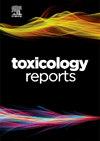蒽环类药物的使用是否与心肌损伤有关?柚皮素和夹竹桃素对阿霉素致大鼠心脏毒性的调节作用
Q1 Environmental Science
引用次数: 0
摘要
柚皮素是橙子、葡萄柚、番茄皮中的一种主要类黄酮,罗布麻素是一种从植物中分离出来的多酚化合物,如罗布麻,已知具有抗氧化、抗炎和抗癌的特性。阿霉素(DOX)是一种抗生素,可有效治疗癌症,但因其易引起心脏毒性而臭名昭著。本研究探讨柚皮素和罗布麻素在dox诱导的心脏毒性中的联合作用。30只大鼠随机分为5组(n = 6):正常对照组(NC)、单纯DOX组、DOX+ 柚皮素组、DOX+ apocynin组和DOX+柚皮素+ apocynin组。DOX(2.5 mg/kg)腹腔注射,每周三次,持续两周(累积剂量为15 mg/kg)。口服柚皮素(50 mg/kg/day)和罗布麻素(25 mg/kg/day)。进行心电图测量,并使用心脏匀浆评估心脏炎症(IL-6、CRP)、心脏毒性(CTnT、LDH、CKMB)和高血压(NO、ACE)标志物。对心脏进行组织病理学检查。阿霉素明显改变心电图,t波大,st段抬高,qrs复合物宽。结果还显示心脏炎症和高血压生物标志物的显著变化。柚皮素和罗布麻素治疗可显著减弱阿霉素对大鼠心电图的影响,降低心脏炎症和高血压生物标志物水平。与仅DOX组相比,柚皮素和罗布麻素处理组心脏细胞结构明显改善。本研究表明,柚皮素和罗布麻素具有心脏保护作用,并可能由于其抗炎和清除自由基的作用而改善阿霉素引起的心脏毒性。本文章由计算机程序翻译,如有差异,请以英文原文为准。
Is the use of anthracyclines implicated in myocardial injury? Investigating the cardio modulatory effects of naringenin and apocynin in doxorubicin-induced cardiotoxicity in rats
Naringenin, a major flavonoid in oranges, grapefruit, tomato skin and apocynin a polyphenolic compound isolated from plants, such as Apocynum cannabinum are known to possess anti-oxidant, anti-inflammatory, and anti-cancer properties. Doxorubicin (DOX) is an antibiotic, effective in the treatment of cancer, but notorious for its propensity to cause cardiotoxicity. This study investigated the combined effects of naringenin and apocynin in DOX-induced cardiac toxicity. Thirty rats were randomly divided into five groups (n = 6) as follows: Normal Control (NC), DOX only, DOX+ naringenin, DOX + apocynin and DOX +naringenin + apocynin. DOX (2.5 mg/kg) was administered intraperitoneally, three times per week for two weeks (cumulative dose of 15 mg/kg). Naringenin (50 mg/kg/day) and apocynin (25 mg/kg/day) were administered orally. ECG measurements were carried out and heart homogenates were used to estimate cardiac inflammatory (IL-6, CRP), cardiac toxicity (CTnT, LDH, CKMB) and hypertensive (NO, ACE) markers. Histopathological examination of the heart was performed. Doxorubicin significantly altered the ECG with large T-wave, ST-elevation and wide QRS-complex. Results also showed significant changes in cardiac inflammatory and hypertensive biomarkers. Naringenin and apocynin treatment significantly attenuated the impact of doxorubicin on rats ECG, decreased biomarkers levels of cardiac inflammatory and hypertensive biomarkers. The cytoarchitecture of heart significantly improved in naringenin and apocynin treated groups, when compared to DOX only group. This study indicates that administration of naringenin and apocynin have cardioprotective ability and also ameliorated cardiotoxicity-induced by doxorubicin probably due to its anti-inflammatory and free radical scavenging properties.
求助全文
通过发布文献求助,成功后即可免费获取论文全文。
去求助
来源期刊

Toxicology Reports
Environmental Science-Health, Toxicology and Mutagenesis
CiteScore
7.60
自引率
0.00%
发文量
228
审稿时长
11 weeks
 求助内容:
求助内容: 应助结果提醒方式:
应助结果提醒方式:


